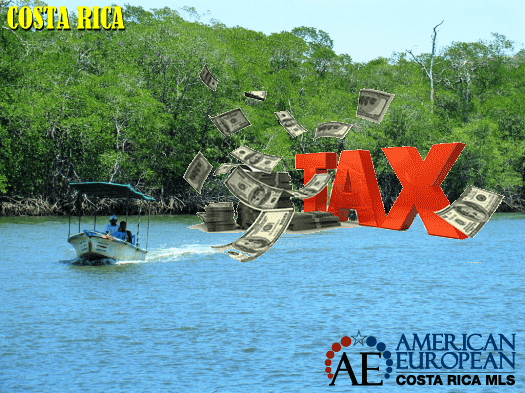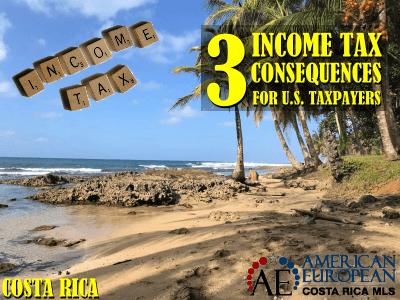Estimated Reading Time: 5 Minutes
Living in Costa Rica might have important income tax consequences for you if you’re a taxpayer in the United States. Americans are increasingly choosing to relocate to destinations like Costa Rica.
Data collected by Datosmacro.com in 2019 show that over 12,000 registered U.S. retirees and ex-pats prefer to live in this Central American country.
Various reasons contribute to their interest in becoming an ex-pat, such as a lower cost of living, the casual laid-back lifestyle, amazing weather, and incredible natural beauty.
If you’ve been considering setting up a home in Costa Rica, figuring out the taxation regulations should be right on top of your list of things to do.
1. Tax Consequences for residents
There are various options for applying for a Costa Rican permanent residency. There are different ways one can get a residency, either as a retiree or as an investor. In that case, one needs to invest at least $200,000 in Costa Rica and that may include buying real estate.
As a resident in Costa Rica, you’ll pay the same rate of income tax as citizens. The taxes are applicable only to the income you earn from sources within the country.
However, if you’re a US citizen, you have to continue to file tax returns in the US each year. Any assets that you own in Costa Rican bank accounts must be reported by filing an FBAR (Foreign Bank Account Report). This rule applies especially in the case of citizens who have 10,000 dollars or higher in a foreign bank or financial institution during the calendar year. It can be challenging to navigate taxes while living abroad. It is best to contact expat tax consulting professionals who can advise you on how to take care of the income tax consequences when moving to Costa Rica.
2. Income Tax for local earners
Costa Rica has different tax rates depending on your source of income in the country. There are, just like most countries, different income tax consequences. In Costa Rica, this depends on your investments, the business, or the real estate you own. Learn all about taxes in Costa Rica here.
Foreign income, such as retirement pensions, is not taxed in Costa Rica. Residents in Costa Rica do have the obligation of paying into the social security system, which is also called Caja Costarricense de Seguro Social or the Caja.
If running a business in Costa Rica, expect to pay 26.17% of the employees’ gross wages to the Costa Rican social security system and 30% income tax, depending on the income. Juggling between businesses in both Costa Rica and back home can be challenging and not recommended.
You do have the option of liquidating the business back home. Then you can focus entirely on the new enterprise in Costa Rica. If this is something you would like to do, hire the services of expert business brokers who can take care of this task for you.

3. Lower the Taxes Payable
This third of the income tax consequences is a positive one, I’m sure you’ll love it. With the advice of your tax consultant, you can take advantage of certain laws that allow you to lower or entirely eliminate tax obligations to the US IRS.
a) The United States and Costa Rica do not have a Social Security Totalization Agreement. Accordingly, any Caja you pay in Costa Rica can be included in the Foreign Tax Credit. In other words, you can deduct the Caja amount from the taxes you pay back home.
b) The U.S. Foreign Earned Income Exclusion law permits you to deduct the first $105,900 of the income you earn from the total taxable amount. You can avail of this benefit if you’re working as an employee or an entrepreneur in Costa Rica. Even if you work for a large multinational organization in Costa Rica on a company posting, you’ll still get this tax break.
c) The Foreign Housing Exclusion program allows ex-pats to make exclusions from their income for household expenses that they might incur while staying in Costa Rica.
Relocating to another country, after pulling out roots in the US, can be an easy decision considering the many benefits of living in Costa Rica. Rely on expert advice that can help you make the transition smooth, hire an AE affiliate broker.
Do you want to learn more about your income tax consequences when living in Costa Rica? Then contact me now.
The Author
Marc J. Strohl, CPA is the founder and managing director of Protax Solutions, one of the largest and most trusted companies specialized in expat tax services. He is one of the leading experts in the taxation of individual US expatriates and/ or foreign nationals. A member of the American Institute of Certified Public Accountants (AICPA) and the New York State Society of Certified Public Accountants (NYSSCPA), Marc has published articles in many critically acclaimed publications including Thomson Reuters’ twice-monthly newsletter publication Practical International Tax Strategies.


















